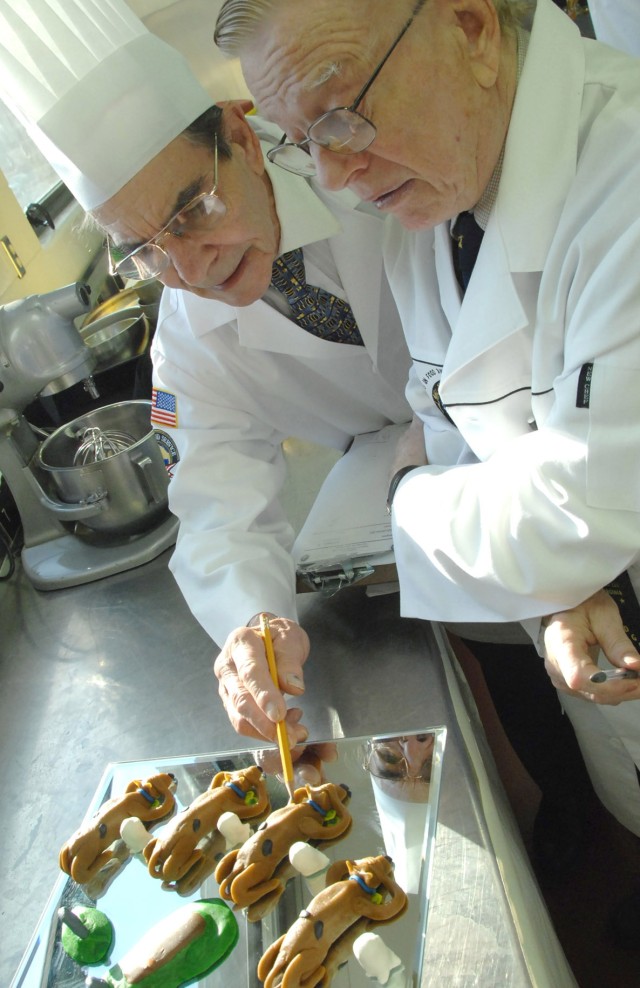Fort Lee, Va. (March 12, 2008) Chef judges do more than just grill the culinarians at this competition. They mentor them as much as they judge their work.
"The competitor should go away feeling good because they know what to do to make themselves better," said Chief Warrant Officer 4 Robert Sparks, Army Center of Excellence, Subsistence, culinary skills division chief.
At the end of each competitor's submission, culinarians stand before judges to receive constructive criticism, encouragement, suggestions to improve and advice on how to avoid pitfalls in the next round.
"The first thing we look for is competent skills," said Chef Judge Geoffrey Acott, British Defence Food Services School. "If they don't understand basic principles of cookery, it's very difficult to deliver a good dish."
Then they look at how well the competitors know and use ingredients.
"Farmers around the world grow some excellent produce, but a poor chef can ruin that process very easily," Acott said.
Lastly, Acott said they hope to see some innovation that can be developed further.
Perhaps equally important to all those principles, even if the competitors do not win a medal on any one category, is they gain something as a result, he said.
"I've said to them many times, first of all to enjoy themselves because if they are not enjoying themselves they shouldn't be here. Secondly, to learn because if they don't go back a better chef than when they came, they've just wasted time," he said.
Acott said this competition is similar in design to regional and some national competitions, but it's important to keep perspective on the military context.
"These guys have skills, there's no doubt, but they don't always receive the opportunity to practice those skills when they're doing large quantity employee feeding, which is what the services are about," Acott said.
Chef Judge Roland Schaeffer, retired senior experimental chef for Heinz, said the competitors don't always have the opportunity to practice like those who work in a restaurant or hotel.
"The competition is a wonderful exercise for them because if they want to start working in a restaurant or hotel when they get out of the Army (or other service), they are better prepared to do a good job," Schaeffer said.
Regardless of what background the competitors bring with them to the kitchen labs, the chef judges are still upholding the same standards.
"Food has to taste good, look good, and hot food is supposed to be hot. That goes for Civilian or military," Schaeffer said.
Some competitors fall under the false impression that because it's a competition, their entries have to be technically difficult.
"While degree of difficulty will score (high), it will only score if it's delivered well," Acott said. "Simple food cooked well will always score over a difficult dish cooked badly."
Passion also makes a difference, Schaeffer said.
"I can see it (on a chef) when I walk into the kitchen, how he presents himself, whether he has good knife skills, and how he moves. I like to see someone almost a little hyper in the kitchen," Schaeffer said.
"We don't want someone who is slow, sloppy and uninterested. You can tell if a person loves what he's doing."
Schaeffer said cooks have to love what they do, especially if they are thinking of a long-term career.
"It's long hours. You work on holidays when everyone else is taking it off, and you have to be Michelangelo every day," he said.
With more than 40 years of cooking in various parts of the world - to include Hollywood, Germany, Switzerland and even on the yacht of an airline owner - Schaeffer is now judging on average two competitions a month.
Anyone with taste buds can judge whether food tastes good, or if a carrot is undercooked, or if a starch lacks flavor. What these experienced judges bring to the competition, that no layman can do, is inspiration to cook better, "to set them up for success," said Sparks.


Social Sharing